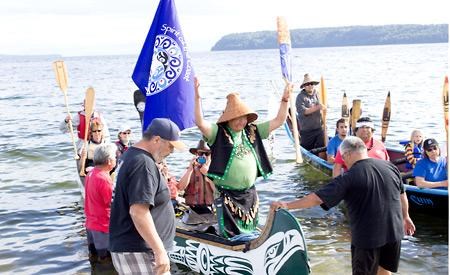An international group of canoeists paddling to Alaska was given a warm traditional welcome as it landed at Tla’amin (Sliammon) Nation Tuesday, June 10.
The paddlers arrived at approximately 5:30 pm after spending the day making their way up from Sechelt First Nation.
Walter Paul, former chief, was one of several Tla’amin community members who welcomed the paddlers.
“To be asked to go out to welcome them was a real honour for me,” said Paul. “Their cause is wonderful.”
The canoeists spent two days in Tla’amin preparing for the next leg of their trip which would take them off the northern tip of Vancouver Island.
The pullers, as they call themselves, left Kwantlen First Nation in Fort Langley to grand send off Sunday, June 1, in their six-person canoe named Hiyakwe e te Stahluxw which translates to “Chief of the River,” from Hun’qu’ma’num. They are led by seasoned nature guide Chris Cooper who has travelled up and down BC’s coast several times by canoe.
The pullers are from BC, Alberta, Ontario, Scotland, England, the US, South Africa and Kwantlen. The team, currently at about a dozen, is being supported by crew on a sailboat who are monitoring their progress. Four paddlers, including Cooper, Brandon Gabriel and Kye Valongo from the Orkney Islands off the north shore of Scotland, are paddling the whole distance with the other eight members of the group paddling for 10-day stretches before spelling each other off.
Tla’amin hosted a feast for the travellers and provided them with accommodation, said Paul.
“It’s a long trip and very tough, but the cause is one that all first nations are taking up at this point as we’re all looking at the Northern Gateway pipeline,” said Paul, who sits in a tribal council with other first nations from Vancouver Island and the Sunshine Coast.
“Even though it’s way up north from here, we will feel the effects here,” he added.
Prime Minister Stephen Harper announced the federal cabinet’s decision to support the contentious energy project this week.
“People from all around are opposed to this project,” Paul said. Once an area as pristine as the North Coast is destroyed, it will never recover, he said. He gave the example of the Exxon-Valdez disaster in Alaska 25 years ago. “It’s still there, they’re still trying to clean it up.”
The group is paddling 1,300 kilometres from Fort Langley to the Alaskan panhandle, to highlight the environmental threats the West Coast faces from oil tankers and liquefied natural gas development. The pullers call their journey, “The Spirit of the Coast.”
The group will need great strength as the next leg of its journey will take 10 days before reaching another settlement.
From there the plan is to arrive in Bella Bella in mid-July for the Tribal Canoe Journeys which brings aboriginal people from Washington State, BC and Alaska together for a celebration of West Coast canoe culture. From Bella Bella, the team will paddle onward to Klemtu, Hartley Bay, Prince Rupert, Kitimat, Port Simpson and to first nations communities along the Alaskan border.
Gabriel, an Kwantlen First Nation artist, said the point of the journey was to give the paddlers the opportunity to see first hand the marine ecology along the coast and to emphasize “alternative viewpoints” on energy projects which threaten coastal communities.
He added that once the journey is complete, a documentary film is planned so word can be spread further to people who may not know the area.
Many on the team have been on canoe trips like this together previously.
Susan Blank, a member from Abbotsford, said she paddles regularly on the Fraser River, so she stays in condition. “This is like travelling the old highways,” she said.
Other paddlers commented that they are conditioning themselves by doing the trip. “I’m preparing for my next trip by doing this one,” said Richard Wagers, a retired teacher from Red Deer, with a chuckle.
Alice Purdey, a paddler from Burnaby, said that everyone on the trip has their own feelings about pipelines and oil tankers, but they are not doing the trip to protest. “It’s to raise awareness of the coast,” she said. “We’re not out there to wave a flag. People can make up their own minds.”



